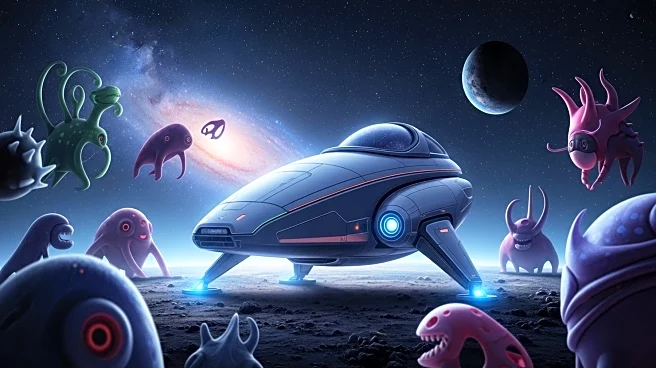What is the story about?
What's Happening?
Russia's Bion-M No. 2 satellite, launched in August, has returned to Earth carrying 75 mice, over 1,500 flies, microorganisms, plant seeds, and cell cultures. The mission, a joint effort between Roscosmos and Russia's Institute of Biomedical Problems, aimed to conduct over 30 experiments in low Earth orbit to further understand how life functions in space. The descent module, nicknamed Noah's Ark, landed in the Orenburg region, sparking a brush fire that was quickly extinguished. Unfortunately, ten mice did not survive the mission. The experiments were designed to develop life support systems that can endure prolonged weightlessness and cosmic radiation, and improve the radiation safety of crewed spacecraft.
Why It's Important?
The Bion-M No. 2 mission is crucial for advancing research on life support systems for long-term human space trips. Understanding how various life forms endure space conditions can inform the development of systems that protect human health during extended missions. The experiments also aimed to test the theory of panspermia, which posits that life on Earth may have originated from bacteria riding asteroids. The results of these experiments could have significant implications for future space exploration and the development of sustainable life support systems for human habitation in space.
What's Next?
The results of the panspermia experiment, which tested whether bacteria on basalt rocks could survive atmospheric re-entry, have yet to be revealed. As space agencies continue to explore the viability of life in space, further research will be necessary to refine life support systems and ensure the safety of astronauts on long-duration missions. The geopolitical landscape of space exploration is shifting, with Russia's ability to collaborate with Western institutions impacted by its invasion of Ukraine. This may affect future international collaborations and the development of space technologies.
Beyond the Headlines
The geopolitical implications of space exploration are significant, as countries vie for dominance in establishing a permanent human presence on the Moon and beyond. The China Manned Space Agency is positioned to become a leading space power, potentially surpassing other nations in space exploration capabilities. The success of missions like Bion-M No. 2 highlights the importance of international collaboration in advancing space research and technology. As space agencies navigate political challenges, the focus on scientific innovation and cooperation remains crucial for the future of human space exploration.















